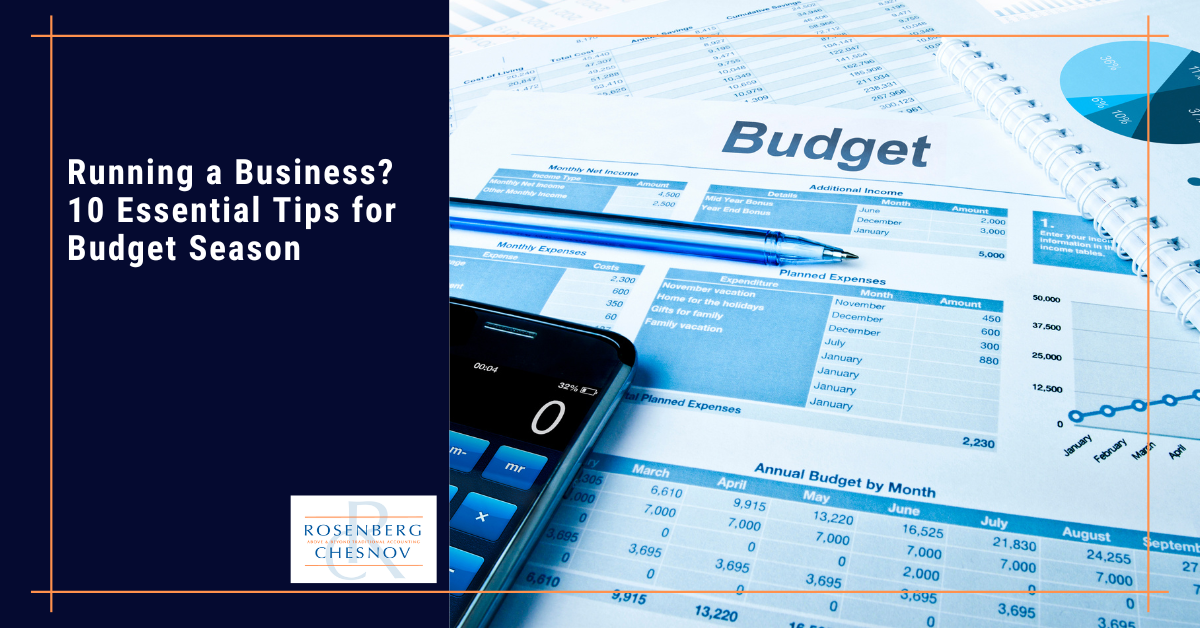

Understanding the FTC Safeguards Rule: A Business Owner’s Guide
Category: Accounting
The end of the year is fast approaching, which means the 2024 budgeting season is, too.
Is your business ready?
A well-thought-out budget can be your financial roadmap, helping your business allocate resources effectively, prioritize objectives, and make more informed decisions.
On the other hand, not putting enough thought into a budget can lead to serious issues. Without a strong budget, your business may struggle to control finances and face cash flow problems. It can also result in the misallocation of resources and poor decisions based on incomplete information, negatively impacting performance and growth.
Perhaps worst of all, a lack of a good budget can even compromise your business’s financial stability and security, leaving it unnecessarily vulnerable to avoidable challenges.
In this article, we’ll explore some simple strategies to help you craft a more robust 2024 budget and set your business up for success and growth in the new year.


No matter your industry or the size of your business, implementing these strategies will help put you on the course to a better budget.
1) Coordinate Across Departments
Involving key stakeholders in the budgeting process is crucial for creating a budget that accurately reflects the organization’s needs.
In addition to allowing for a better understanding of each department’s priorities and ensuring allocation is effective, maintaining solid communication channels can ensure that all departments remain aligned with the company’s financial goals, providing a unified direction and even preventing duplicate expenditures.
Finally, strong collaborative work, including executives, managers, and team leaders from all departments, can also promote transparency and foster a sense of ownership, as they are actively involved in the budgeting process.
2) Carefully Forecast Expenses and Costs
Slight cost increases add up fast! That’s why anticipating everything from insurance rates and shipping expenses to energy costs and payroll taxes is a fundamental step in budgeting.
Every dollar allocated must be carefully planned and forecasted for the upcoming year. This also includes being vigilant about renewal fees, recurring vendor costs, and potential changes in pricing models.
Moreover, a comprehensive financial forecast can provide a clearer picture of the company’s current and future fiscal conditions, guiding key decisions.
By staying ahead of potential changes, you can avoid surprises that could derail your budget.
3) Review Past Budgets
By understanding your past, you can make more informed decisions for the future. When running a business, that means reviewing historical data to glean invaluable insights — especially for planning your budget.
Examining past expenditures can help identify spending patterns and benchmarks for future projections and help in understanding cost trends, the accuracy of previous forecasts, and the financial impact of past decisions.
All of these questions can help you make more accurate forecasts and guide goal-setting for the upcoming budget cycle.
4) Align Budgeting with Strategy
Budgeting isn’t just about controlling costs or balancing income and expenses; it’s also about aligning your financial resources with the larger strategic objectives of your company.
For example, the budget for a Chief Technology Officer should support strategic priorities such as innovation, cybersecurity, and leveraging cloud services. Without this alignment, there could be a risk of ineffective spending and a failure to meet key performance indicators.
This is an example of why aligning budgeting with strategy aids in making necessary adjustments while considering ongoing developments that could impact the current and next year.
5) Automate Data Collection
It seems abundantly clear that budget creation should be a data-driven process. However, any data-driven process is only as good as the data itself — and gathering and organizing in-house data is often time-consuming, disorganized, and error-prone.
Leveraging automation can significantly streamline this endeavor.
There are numerous budgeting tools and software available that can automate data collection, reducing the risk of errors and saving valuable time. These tools can also provide real-time insights and analytics, helping you monitor your budget and make adjustments as necessary.
Speaking of technology…
6) Pair the Right Tools with the Job
Where in the running of your business is efficiency more critical than budgeting?
Although there is no one-size-fits-all tech solution, choosing one that fits your process can significantly enhance accuracy, efficiency, and even security — aiding in future-proofing the business by safeguarding against cyber threats.
Additionally, replacing outdated legacy systems with new technology can reduce costs in the long term.
From cloud-based tools to advanced data analytics software, finding the right combination of tools for your needs can supercharge data collection, forecasting, expense tracking, and more.
7) Consider Industry Standards and Trends
What are the average costs of doing business in your industry, how does your business compare, and how is this reflected in your budget?
Is your budget competitive while also being realistic and achievable?
Trends (such as the emphasis on soft skills and sustainable business practices) can shape the future of industries and influence consumer expectations, preferences, and behavior.
By understanding and meeting these standards, you can prepare your business for future changes by investing in the right growth areas.
For example, companies investing in training and workforce development have seen significant returns. By keeping an eye on trends, you can make more informed and strategic budgeting decisions and ensure your projections reflect the realities of your business environment.
8) Embrace Contingency Planning
Today’s business landscape feels more unpredictable than ever, so having a contingency plan is more important than ever.
Whether it’s a sudden market downturn, equipment failure, or an unforeseen opportunity, having a financial cushion can help your business navigate unexpected crises or setbacks without compromising its financial health.
It can also help a business capitalize on success by identifying potential funding sources and cost-cutting measures in advance. This includes securing cash reserves, lines of credit, loans, and business continuity insurance and identifying areas where you can reduce expenses.
9) Regularly Track and Evaluate Budget Performance
Creating a budget is only the first step; regularly tracking and evaluating its performance is equally important.
Monitoring and evaluating allow businesses to understand their financial performance against set goals, providing insights into how well they perform in relation to their budget. By comparing actual results with budgeted figures, you can measure performance, identify deviations, and take corrective actions promptly.
Moreover, this process aids in controlling spending and focusing on cash flow, cost reduction, and profit improvement. It also ensures that the business has the resources to execute initiatives and reach goals.
10) Start Early and Stay Proactive
You know what they say: The early bird gets enough time to gather the necessary data, involve key stakeholders, and make thoughtful decisions.
Or…something like that.
Starting the budgeting process early also allows you to thoroughly analyze the current year’s data to understand trends and performance and carefully consider goals that align with the company’s priorities.
Likewise, staying proactive throughout the process allows you to stay aware of market changes and geopolitical landscape changes, which can impact costs and market cycles.
Proactive budgeting also allows you to anticipate challenges and opportunities, making your budget a strategic tool for growth and innovation.
Remember, budgeting is an ongoing process, and it’s a good idea to stay engaged and flexible throughout 2024. However, by implementing these tips as you approach this budget season, you will be ready to hit the ground running next year and seize every opportunity for growth.
As always, our team stands ready to assist you in any way we can.
If you are a client and would like to book a consultation, call us at +1 (212) 382-3939 or contact us here to set up a time.
If you aren’t a client, why not? We can take care of your accounting, bookkeeping, tax, and CFO needs so that you don’t have to worry about any of them. Interested? Contact us here to set up a no-obligation consultation.
Interested in receiving updates in your mailbox? Check out our newsletter, full of information you can use. It comes out once every two weeks, and you can register for it below.


Category: Accounting


Category: Management


Category: Management
Send us a message and we will contact you as soon as possible.
Jeff Coyle, CPA, Partner of Rosenberg Chesnov, has been with the firm since 2015. He joined the firm after 20 years of business and accounting experience where he learned the value of accurate reporting, using financial information as a basis for good business decisions and the importance of accounting for management.
He is a diligent financial professional, able to manage the details and turn them into relevant business leading information. He has a strong financial background in construction, technology, consulting services and risk management. He also knows what it takes to create organizations having built teams, grown companies and designed processes for financial analysis and reporting.
His business experience includes:
Creating and preparing financial reporting, budgeting and forecasting.
Planning and preparation of GAAP and other basis financial statements.
Providing insight on financial results and providing advice based on those results.
Jeff also has a long history of helping individuals manage their taxes and plan their finances including:
Income tax planning and strategy.
Filing quarterly and annual taxes.
Audit support.
General financial and planning advice.
Prior to joining the firm in 2015, Jeff was in the private sector where he held senior financial and management positions including Controller and Chief Financial Officer. He has experience across industries, including construction, technology and professional services which gives him a deep understanding of business.
Jeff graduated from Montclair State University, he is a CPA and member of the American Institute of Certified Public Accountants, New York State Society of Certified Public Accountants and New Jersey State Society of Public Accountants.
Jody H. Chesnov, CPA, Managing Partner of Rosenberg Chesnov, has been with the firm since 2004. After a career of public accounting and general management, Jody knows the value of good financials. Clarity, decision making, and strategy all start with the facts – Jody has been revealing the facts and turning them into good business results for more than three decades.
He takes a pragmatic approach to accounting, finance and business. His work has supported many companies on their path to growth, including helping them find investors, manage scaling and overcome hurdles. His experience and passion for business reach beyond accounting and he helps businesses focus on what the numbers mean organizationally, operationally and financially.
He has a particular expertise in early-stage growth companies. His strengths lie in cutting through the noise to come up with useful, out of the box, solutions that support clients in building their businesses and realizing their larger visions.
Prior to joining the firm in 2004, Jody was in the private sector where he held senior financial and management positions including General Manager, Chief Financial Officer and Controller. He has experience across industries, which gives him a deep understanding of business.
Jody graduated with a BBA in Accounting from Baruch College, he is a CPA and member of the American Institute of Certified Public Accountants and New York State Society of Certified Public Accountants.
In addition to delivering above and beyond accounting results, Jody is a member of the NYSCPA’s Emerging Tech Entrepreneurial Committee (ETEC), Private Equity and Venture Capital Committee and Family Office Committee.
He is an angel investor through the Westchester Angels, and has served as an advisor for many startup companies and as a mentor through the Founders Institute.